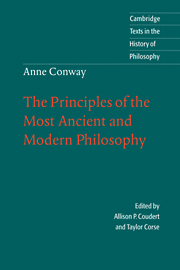Book contents
- Frontmatter
- Contents
- Acknowledgments
- Introduction
- Chronology
- Further reading
- Note on the text
- The Principles of the Most Ancient and Modern Philosophy
- Unpublished Preface by Henry More
- Published Preface
- Chapter I
- Chapter II
- Chapter III
- Chapter IV
- Chapter V
- Chapter VI
- Chapter VII
- Chapter VIII
- Chapter IX
- Index
- Cambridge Texts in the History of Philosophy
Chapter V
Published online by Cambridge University Press: 18 November 2009
- Frontmatter
- Contents
- Acknowledgments
- Introduction
- Chronology
- Further reading
- Note on the text
- The Principles of the Most Ancient and Modern Philosophy
- Unpublished Preface by Henry More
- Published Preface
- Chapter I
- Chapter II
- Chapter III
- Chapter IV
- Chapter V
- Chapter VI
- Chapter VII
- Chapter VIII
- Chapter IX
- Index
- Cambridge Texts in the History of Philosophy
Summary
S. 1. That the ancient Kabbalists recognized the first-born son of God, whom they called the celestial Adam, the first Adam, the great priest. S. 2. That Christ is the mediator between God and all creatures. S. 3. That such a being is a mediator is as demonstrable from the principles of sound reason as is the existence of God. S. 4. That God is as immediately present in Christ as in all creatures. S. 5. That Christ cannot become evil but he can become good and consequently he partakes both of divinity and creatureliness as well as eternity and time. S. 6. That neither Christ nor those who are perfectly united with him are subject to the laws of time insofar as time signifies the destruction of things. S. 7. In this sense, we can be said to transcend time and rise above it into a higher region.
S. 1. Although some things have already been said in the previous chapter about the son of God, who is the first born of all creatures, nevertheless many things remain to be said about this matter which are necessary for the correct understanding of what follows; hence for that reason we write this chapter. By the son of God (the first born of all creatures, whom we Christians call Jesus Christ, according to Scripture, as shown above) is understood not only his divinity but his humanity in eternal union with the Divinity; that is, his celestial humanity was united with the Divinity before the creation of the world and before his incarnation.
- Type
- Chapter
- Information
- Publisher: Cambridge University PressPrint publication year: 1996

